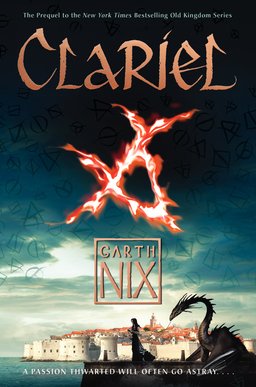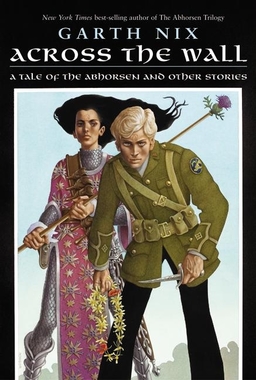The Series Series: Clariel by Garth Nix
 Clariel is a surprise, not quite like anything we’ve seen from the Garth Nix’s Old Kingdom series. For a longtime fan of the Old Kingdom, Clariel stands alone well — its plot arc is complete and satisfying in one volume — but for a newcomer to the Old Kingdom, it’s still best to start at the beginning. Fortunately for any of you who are newcomers, the beginning is awesome and absolutely worth backtracking for.
Clariel is a surprise, not quite like anything we’ve seen from the Garth Nix’s Old Kingdom series. For a longtime fan of the Old Kingdom, Clariel stands alone well — its plot arc is complete and satisfying in one volume — but for a newcomer to the Old Kingdom, it’s still best to start at the beginning. Fortunately for any of you who are newcomers, the beginning is awesome and absolutely worth backtracking for.
Like its predecessors, Clariel offers exceptionally disturbing monsters, the tragic undead, gorgeous worldbuilding, and coming-of-age anxiety that uses its powers for good. Well, in Clariel, the good is more complicated than ever before, because the title character has no talent for the Charter Magic that could connect her to the natural laws and relationships that make her world possible. Clariel’s knack is for Free Magic. While the Free part sounds good at first, Free Magic tends to corrode all relationships based on compassion, protection, and kinship, instead dragging its human practitioners into the thrall of monstrous beings older than the world. How can a girl with such a knack come into her power without destroying everything she holds dear?
Garth Nix’s novels of the Old Kingdom are among my favorite YA books. The first volume, Sabriel, is a consistent favorite of my students, too. A family of benevolent necromancers keep the dead down in a nation that barely holds together against a deviously masterminded invasion from the afterworld. Sabriel comes of age as she struggles to save what’s left of a basically failed state. The title character in Lirael discovers her connection with the Abhorsen family a generation later, when the Old Kingdom’s fragile new peace is threatened by an even more ancient foe, and in Abhorsen the whole family gathers for some very deep magic that opens new questions about the underpinnings of their whole world.
For a long time, it looked as if Nix had said all he wanted to say about the Old Kingdom, until a lovely novella anchored and titled Nix’s eclectic short fiction collection Across the Wall: A Tale of the Abhorsen and Other Stories. One way to put it: “Across the Wall” is a wild thrill ride in which a young man who has journeyed in the Old Kingdom recognizes a sinister creature just before it escapes from a laboratory and tears a bloody swath across a neighboring country that has forgotten its magic. He hunts the monster relentlessly, saves everyone he can, and crosses the border back to the companions who can help him defeat it.
 Another way to put it: “Across the Wall” turns from the struggle to maintain the boundary between life and death, concentrating instead on the constant tension between the cosmic Charter and Free Magic.
Another way to put it: “Across the Wall” turns from the struggle to maintain the boundary between life and death, concentrating instead on the constant tension between the cosmic Charter and Free Magic.
The Charter, as Nix imagines it, is sort of like a benevolent Matrix. Everything that makes up the world is, in turn, made up of symbols and ideas from the compact that the universe’s friendly original beings agreed to so that life could come into existence. The remaining original beings refused, choosing their own freedom regardless of the cost to anyone or anything else — and here there be monsters. The Great Charters sought, and still seek through their descendents, to bind the Free Magic beings against their will, so that life will not be destroyed. But the choice between restraint and freedom is distinctly different from a choice between good and evil
In addition to exploring new possibilities in the Old Kingdom’s magic, Clariel takes us to see a period in the Kingdom’s history that no previous book has revealed. The nation we first saw in tatters in Sabriel stands flourishing six-hundred years earlier, in a period of such peace and prosperity that its people have grown complacent. The Abhorsen family, whose heroic service we have seen in later periods, stands in disrepute, regarded as analogous to rat-catchers, precisely because they have been so successful in reducing the threat from the undead to rare and minor pesky intrusions. The Abhorsens themselves have had so few occasions to travel into Death that they regard that place not with the careful respect we see in Sabriel, but rather with panicky aversion. Meanwhile, the King sees no one and does nothing, hoping his passive-aggressive inaction will entice his vanished heir into coming home. A power vacuum like that attracts bad actors, both human and supernatural.
Into the magic-averse capital city, Belisaere, comes a young girl from the forest town of Estwael. All Clariel has ever longed to do was join the Royal Borderers and keep the King’s peace in the wild greenwood. She has spent her childhood avoiding her well-intentioned but emotionally distant parents, instead studying woodcraft and fighting arts. When her mother, descended from both the royal house and the Abhorsens, is called into Belisaere to rule the Goldsmiths’ Guild, Clariel must leave a life of freedom in which she has come very close to securing the position in the Borderers that she aspires to. Instead, she must learn how to comport herself in the public eye as her family discovers that her mother may accidentally become the most powerful person in the capital.
We get a brief glimpse of a finishing school for the teenage children of Belisaere’s proud and powerful, where cliquish snits degenerate in a matter of chapters to a state of mortal peril. Charter Magic is a practice in such disgrace that, though everyone knows it works, only servants will stoop to do it. Nonetheless, Clariel’s mother makes sure her daughter gets a good Charter Magic teacher to instruct her in the arts of her ancestors. Clariel has power, and a berserker streak that makes her wildly effective, when she’s not endangering her friends.
It’s in Clariel’s dedication to mastering her royal berserker heritage that we see her at her best. That’s also where we see the most intriguing glimpses of where the series may go next. Garth Nix has said that his next novel will return to a character from Abhorsen who has had an infusion of Free Magic, and that character may well take the the balance between profound self-discipline and profoundly untamed magic that Clariel struggles with into yet another fresh take on the Old Kingdom.
Sarah Avery’s short story “The War of the Wheat Berry Year” appeared in the last print issue of Black Gate. Her contemporary fantasy novella collection, Tales from Rugosa Coven, follows the adventures of some very modern Pagans in a supernatural version of New Jersey even weirder than the one you think you know. The Trafficking in Magic, Magicking in Traffic anthology she coedited with David Sklar includes stories from James Enge, Elizabeth Bear, and Darrell Schweitzer. You can keep up with her at her website, sarahavery.com, and follow her on Twitter.